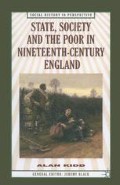Abstract
During the first two decades of the twentieth century, the liberal conception of rights and responsibilities, which had underwritten the political and social system of the Victorian era, began to disintegrate as central governments increasingly intervened in domains, such as social welfare and industrial relations, formerly confined to the ‘private sphere’. The intellectual roots of this chiefly lay in the New Liberal redefinition of liberty in the late nineteenth century, in which negative determinations of liberal basic rights were superseded by the ‘positive’ rights of opportunity and social ‘justice’ to be realised through the actions of the state.1 International trade and imperialistic rivalries encouraged the process, culminating in the experience of the First World War, which did considerable damage to ‘liberal’ values. Ultimately, the ‘liberal state’ was transformed into the post-1945 ‘social welfare state’ in which central government stood committed to the social rights of citizens.
Preview
Unable to display preview. Download preview PDF.
Notes
For the social theory of New Liberalism, see M. Freeden, The New Liberalism: An Ideology of Social Reform (Oxford, 1978);
P. Weiler, The New Liberalism: Liberal Social Theory in Great Britain, 1889–1914 (New York, 1982).
The importance of the friendly societies as a model for health insurance is stressed in E. P. Hennock, British Social Reform and German Precedents: The Case of Social Insurance, 1880–1914 (Oxford, 1987), p. 189.
See, for example, M. Loney, ed., The State or the Market: Politics and Welfare in Contemporary Britain (1987).
Charities Aid Foundation, Dimensions of the Voluntary Sector: Key Facts, Figures, Analysis and Trends (West Malling, Kent, 1997), p. 164;
J. Kendall and M. Knapp, The Voluntary Sector in the United Kingdom (Manchester, 1996), p. 111.
For ‘citizenship’, see T. H. Marshall, Citizenship and Social Class (Cambridge, 1950).
For current views on poverty, see for example, B. Nolan and C. Whelan, Resources, Deprivation and Poverty (Oxford, 1996);
D. Gordon and C. Pantazis, eds, Breadline Britain in the 1990s (Aldershot, 1997).
Author information
Authors and Affiliations
Copyright information
© 1999 A. J. Kidd
About this chapter
Cite this chapter
Kidd, A. (1999). Poverty and Welfare in Historical Perspective. In: State, Society and the Poor. Social History in Perspective. Palgrave, London. https://doi.org/10.1007/978-1-349-27613-4_5
Download citation
DOI: https://doi.org/10.1007/978-1-349-27613-4_5
Publisher Name: Palgrave, London
Print ISBN: 978-0-333-63254-3
Online ISBN: 978-1-349-27613-4
eBook Packages: Palgrave History CollectionHistory (R0)

